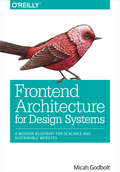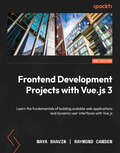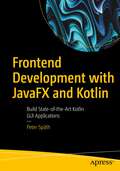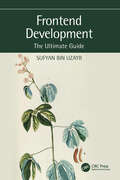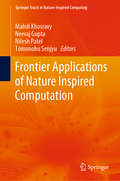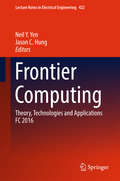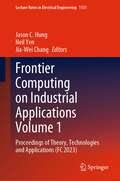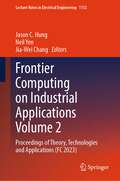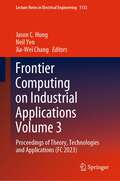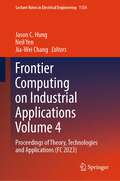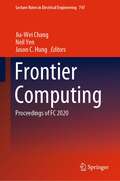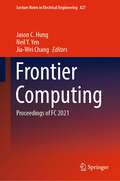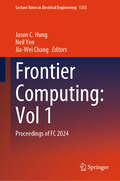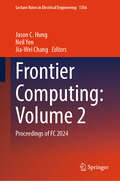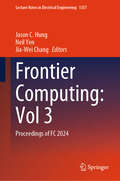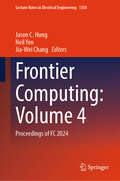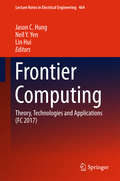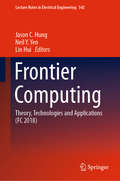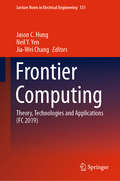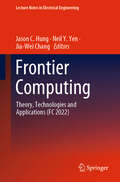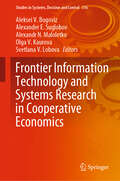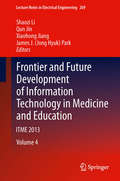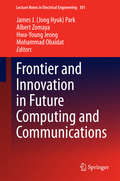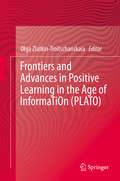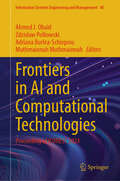- Table View
- List View
Frontend Architecture for Design Systems: A Modern Blueprint for Scalable and Sustainable Websites
by Micah GodboltImagine what a large-scale web project would look like if frontend development were not treated as an add-on, but as an equal partner with backend development and content strategy. This practical book takes experienced web developers through the new discipline of frontend architecture, including the latest tools, standards, and best practices that have elevated frontend web development to an entirely new level.Using real-world examples, case studies, and practical tips and tricks throughout, author Micah Godbolt introduces you to the four pillars of frontend architecture. He also provides compelling arguments for developers who want to embrace the mantle of frontend architect and fight to make it a first-class citizen in their next project.The four pillars include:Code: how to approach the HTML, CSS, and JavaScript of a design systemProcess: tools and processes for creating an efficient and error-proof workflowTesting: creating a stable foundation on which to build your siteDocumentation: tools for writing documentation while the work is in progress
Frontend Development Projects with Vue.js 3: Learn the fundamentals of building scalable web applications and dynamic user interfaces with Vue.js, 2nd Edition
by Raymond Camden Maya ShavinLet industry experts guide you on your journey to becoming a Vue.js developer with the help of practical projects and fun exercisesPurchase of the print or Kindle book includes a free PDF eBookKey FeaturesWork through mini projects, exercises, and activities to learn Vue.js in a practical wayCreate dynamic components and user interfaces that are fast and intuitiveFind out how you can get the most out of the Vue.js 3 framework and build an end-to-end projectBook DescriptionAre you looking to use Vue.js 3 for building web apps but don't know where to begin?Frontend Development Projects with Vue.js 3 will help you get to grips with the core concepts of this JavaScript framework using practical examples that simulate real-world web projects. With this updated edition, you'll experience all aspects of the new and improved Vue.js 3 as you work on mini projects such as a chat interface, a shopping cart, a price calculator, a to-do app, and a profile card generator for storing contact details. These realistic projects are presented as bite-size exercises that you can enjoy even as you challenge yourself.Throughout the book, you'll discover how to manage data in Vue components, define communication interfaces between components, and handle static and dynamic routing to control application flow. You'll also work with Vite and Vue DevTools and learn how to handle transition and animation effects for an engaging user experience. Finally, you'll see how to test your app and deploy it to the web.By the end of this Vue.js book, you'll have the skills that enable you to work like an experienced Vue developer to build professional apps that can be used by others and have the confidence to tackle real-world frontend web development problems.What you will learnSet up a development environment and start your first Vue.js 3 projectModularize a Vue application using component hierarchiesUse external JavaScript libraries to create animationsShare state between components and use Pinia for state managementWork with APIs using Pinia and Axios to fetch remote dataValidate functionality with unit testing and end-to-end testingGet to grips with web app deploymentWho this book is forThis book is designed for Vue.js beginners. Whether this is your first JavaScript framework, or if you're already familiar with React or Angular, this book will get you on the right track. To understand the concepts explained in this book, you must be familiar with HTML, CSS, JavaScript, and Node package management.
Frontend Development with JavaFX and Kotlin: Build State-of-the-Art Kotlin GUI Applications
by Peter SpäthBuild elegant, responsive, and stable Java Virtual Machine-based client applications (Fat Clients) with modern user interfaces. This book introduces JavaFX as a frontend technology and utilizes Kotlin instead of Java for coding program artifacts to boost code expressiveness and maintainability. Author Peter Späth employs a hands-on approach, providing practical examples and code to demonstrate each concept. Mid-level Java programming knowledge and a basic understanding of Kotlin are the only prerequisites; experience with JavaFX and frontend coding is not essential. JavaFX is a modern frontend programming toolkit equipped with containers, menus, buttons, sliders, text fields, and various other controls necessary for communicating with your users, all of which are covered here. Despite its name, JavaFX applications can be coded with programming languages other than Java. The central requirement is that any language targeting JavaFX compiles to artifacts runnable on a Java Virtual Machine. Over the course of this book, you’ll learn firsthand why Kotlin, with its elegant and concise syntax, is a perfect match. After completing Frontend Development With JavaFX and Kotlin, you will be able to build frontends of mid-to-high level complexity, depending on present Java skills, and use Kotlin as a language for addressing GUI programming needs and accessing the JavaFX API. What You Will Learn Create a JavaFX + Kotlin development pipeline for Gradle, Eclipse and IntelliJUse JavaFX scenes, stages, and nodes/controlsMaster JavaFX event handling, effects, and animation using KotlinUnderstand the JavaFX Concurrency Framework and Kotlin Coroutines for JavaFX Who This Book Is For Low- to mid-level Java or Kotlin developers with or without JavaFX experience who wish to learn how to build JavaFX applications with Kotlin.
Frontend Development: The Ultimate Guide
by Sufyan bin UzayrFrontend development is the process of creating user-interactive components. User interfaces, buttons, user-entered data, webpages, and user experience (UX) features are all examples of frontend development. User experience is the primary focus of frontend development. As frontend engineers, you build the portions of an application that are directly accessed by end users using relevant coding and design approaches with the goal of making the overall interface elegant, easy to use, fast, and secure, fostering user engagement and interaction. Frontend development is the process of transforming data into a graphical user interface. The essential foundations of frontend web development have always been HTML, CSS, and JavaScript. Anyone interested in becoming a frontend developer has a bright future ahead of them. Increased Internet usage, particularly on mobile devices, necessitates more user interfaces, resulting in more frontend developer jobs. The role of frontend web developers is more crucial than it has ever been. Key Features: • A step-by-step approach to problem-solving and skill development • A quick run-through of the basic concepts in the form of a “Crash Course” • An advanced, hands-on core concepts with a focus on real-world problems • An industy-level coding paradigm, practice-oriented explanatory approach • A special emphasis on writing clean and optimized code, with additional chapters focused on coding methodology
Frontier Applications of Nature Inspired Computation (Springer Tracts in Nature-Inspired Computing)
by Neeraj Gupta Tomonobu Senjyu Mahdi Khosravy Nilesh PatelThis book addresses the frontier advances in the theory and application of nature-inspired optimization techniques, including solving the quadratic assignment problem, prediction in nature-inspired dynamic optimization, the lion algorithm and its applications, optimizing the operation scheduling of microgrids, PID controllers for two-legged robots, optimizing crane operating times, planning electrical energy distribution systems, automatic design and evaluation of classification pipelines, and optimizing wind-energy power generation plants. The book also presents a variety of nature-inspired methods and illustrates methods of adapting these to said applications. Nature-inspired computation, developed by mimicking natural phenomena, makes a significant contribution toward the solution of non-convex optimization problems that normal mathematical optimizers fail to solve. As such, a wide range of nature-inspired computing approaches has been used in multidisciplinary engineering applications. Written by researchers and developers from a variety of fields, this book presents the latest findings, novel techniques and pioneering applications.
Frontier Computing
by Neil Y. Yen Jason C. HungThis volume contains the proceedings of the 5th International Conference on Frontier Computing (FC 2016), Tokyo, Japan, July 13-15, 2016. This international meeting provided a forum for researchers to share current understanding of recent advances and emergence in information technology, science, and engineering, with themes in the scope of Communication Networks, Business Intelligence and Knowledge Management, Web Intelligence, and any related fields that further the development of information technology. The articles presented cover a wide spectrum of topics: database and data mining, networking and communications, web and internet of things, embedded system, soft computing, social network analysis, security and privacy, optics communication, and ubiquitous/pervasive computing. Many papers report results of great academic potential and value, and in addition, indicate promising directions of research in the focused realm of this conference series. Readers, including students, academic researchers, and professionals, will benefit from the results presented in this book. It also provides an overview of current research and can be used as a guidebook for those new to the field.
Frontier Computing on Industrial Applications Volume 1: Proceedings of Theory, Technologies and Applications (FC 2023) (Lecture Notes in Electrical Engineering #1131)
by Jason C. Hung Neil Yen Jia-Wei ChangThis book gathers the proceedings of the 13th International Conference on Frontier Computing, held in Tokyo, on July 10–13, 2023, and provides comprehensive coverage of the latest advances and trends in information technology, science, and engineering. It addresses a number of broad themes, including communication networks, business intelligence and knowledge management, Web intelligence, and related fields that inspire the development of information technology. The respective contributions cover a wide range of topics: database and data mining, networking and communications, Web and Internet of things, embedded systems, soft computing, social network analysis, security and privacy, optical communication, and ubiquitous/pervasive computing. Many of the papers outline promising future research directions, and the book benefits students, researchers, and professionals alike. Further, it offers a useful reference guide for newcomers to the field.
Frontier Computing on Industrial Applications Volume 2: Proceedings of Theory, Technologies and Applications (FC 2023) (Lecture Notes in Electrical Engineering #1132)
by Jason C. Hung Neil Yen Jia-Wei ChangThis book gathers the proceedings of the 13th International Conference on Frontier Computing, held in Tokyo, on July 10–13, 2023, and provides comprehensive coverage of the latest advances and trends in information technology, science, and engineering. It addresses a number of broad themes, including communication networks, business intelligence and knowledge management, Web intelligence, and related fields that inspire the development of information technology. The respective contributions cover a wide range of topics: database and data mining, networking and communications, Web and Internet of things, embedded systems, soft computing, social network analysis, security and privacy, optical communication, and ubiquitous/pervasive computing. Many of the papers outline promising future research directions, and the book benefits students, researchers, and professionals alike. Further, it offers a useful reference guide for newcomers to the field.
Frontier Computing on Industrial Applications Volume 3: Proceedings of Theory, Technologies and Applications (FC 2023) (Lecture Notes in Electrical Engineering #1133)
by Jason C. Hung Neil Yen Jia-Wei ChangThis book gathers the proceedings of the 13th International Conference on Frontier Computing, held in Tokyo, on July 10–13, 2023, and provides comprehensive coverage of the latest advances and trends in information technology, science, and engineering. It addresses a number of broad themes, including communication networks, business intelligence and knowledge management, Web intelligence, and related fields that inspire the development of information technology. The respective contributions cover a wide range of topics: database and data mining, networking and communications, Web and Internet of things, embedded systems, soft computing, social network analysis, security and privacy, optical communication, and ubiquitous/pervasive computing. Many of the papers outline promising future research directions, and the book benefits students, researchers, and professionals alike. Further, it offers a useful reference guide for newcomers to the field.
Frontier Computing on Industrial Applications Volume 4: Proceedings of Theory, Technologies and Applications (FC 2023) (Lecture Notes in Electrical Engineering #1134)
by Jason C. Hung Neil Yen Jia-Wei ChangThis book gathers the proceedings of the 13th International Conference on Frontier Computing, held in Tokyo, on July 10–13, 2023, and provides comprehensive coverage of the latest advances and trends in information technology, science, and engineering. It addresses a number of broad themes, including communication networks, business intelligence and knowledge management, Web intelligence, and related fields that inspire the development of information technology. The respective contributions cover a wide range of topics: database and data mining, networking and communications, Web and Internet of things, embedded systems, soft computing, social network analysis, security and privacy, optical communication, and ubiquitous/pervasive computing. Many of the papers outline promising future research directions, and the book benefits students, researchers, and professionals alike. Further, it offers a useful reference guide for newcomers to the field.
Frontier Computing: Proceedings of FC 2020 (Lecture Notes in Electrical Engineering #747)
by Jason C. Hung Neil Yen Jia-Wei ChangThis book gathers the proceedings of the 10th International Conference on Frontier Computing, held in Singapore, on July 10–13, 2020, and provides comprehensive coverage of the latest advances and trends in information technology, science, and engineering. It addresses a number of broad themes, including communication networks, business intelligence and knowledge management, web intelligence, and related fields that inspire the development of information technology. The respective contributions cover a wide range of topics: database and data mining, networking and communications, web and Internet of things, embedded systems, soft computing, social network analysis, security and privacy, optical communication, and ubiquitous/pervasive computing. Many of the papers outline promising future research directions, and the book benefits students, researchers, and professionals alike. Further, it offers a useful reference guide for newcomers to the field.
Frontier Computing: Proceedings of FC 2021 (Lecture Notes in Electrical Engineering #827)
by Neil Y. Yen Jason C. Hung Jia-Wei ChangThis book gathers the proceedings of the 11th International Conference on Frontier Computing, held in Seoul, on July 13–17, 2021, and provides comprehensive coverage of the latest advances and trends in information technology, science, and engineering. It addresses a number of broad themes, including communication networks, business intelligence and knowledge management, Web intelligence, and related fields that inspire the development of information technology. The respective contributions cover a wide range of topics: database and data mining, networking and communications, Web and Internet of things, embedded systems, soft computing, social network analysis, security and privacy, optical communication, and ubiquitous/pervasive computing. Many of the papers outline promising future research directions, and the book benefits students, researchers, and professionals alike. Further, it offers a useful reference guide for newcomers to the field.
Frontier Computing: Proceedings of FC 2024 (Lecture Notes in Electrical Engineering #1355)
by Jason C. Hung Neil Yen Jia-Wei ChangThis book covers issues of computer science, application on cloud computing, information security and describes applications of frontier computing. Frontier Computing conference aims at providing an open forum to reach a comprehensive understanding to the recent advances and emergence in information technology, science, and engineering, with the themes in the scope of Communication Network, Business Intelligence and Knowledge Management, Web Intelligence, and any related fields that prompt the development of information technology. Articles cover a wide spectrum of topics: database and data mining, networking and communications, web and internet of things, embedded system, soft computing, social network analysis, security and privacy, optics communication, and ubiquitous/pervasive computing. Many papers have shown their great academic potential and value, and in addition, indicate promising directions of research in the focused realm of this conference series. Readers who will benefit from this comprehensive overview of the latest in information technology include students, researchers, and industry professionals in the fields of cloud computing, internet of things, machine learning, information security, multimedia systems, information technology, and so on. The book also serves as a comprehensive overview for young investigators looking to start a new research program.
Frontier Computing: Proceedings of FC 2024 (Lecture Notes in Electrical Engineering #1356)
by Jason C. Hung Neil Yen Jia-Wei ChangThis book covers issues of computer science, application on cloud computing, information security and describes applications of frontier computing. Frontier Computing conference aims at providing an open forum to reach a comprehensive understanding to the recent advances and emergence in information technology, science, and engineering, with the themes in the scope of Communication Network, Business Intelligence and Knowledge Management, Web Intelligence, and any related fields that prompt the development of information technology. Articles cover a wide spectrum of topics: database and data mining, networking and communications, web and internet of things, embedded system, soft computing, social network analysis, security and privacy, optics communication, and ubiquitous/pervasive computing. Many papers have shown their great academic potential and value, and in addition, indicate promising directions of research in the focused realm of this conference series. Readers who will benefit from this comprehensive overview of the latest in information technology include students, researchers, and industry professionals in the fields of cloud computing, internet of things, machine learning, information security, multimedia systems, information technology, and so on. The book also serves as a comprehensive overview for young investigators looking to start a new research program.
Frontier Computing: Proceedings of FC 2024 (Lecture Notes in Electrical Engineering #1357)
by Jason C. Hung Neil Yen Jia-Wei ChangThis book covers issues of computer science, application on cloud computing, information security and describes applications of frontier computing. Frontier Computing conference aims at providing an open forum to reach a comprehensive understanding to the recent advances and emergence in information technology, science, and engineering, with the themes in the scope of Communication Network, Business Intelligence and Knowledge Management, Web Intelligence, and any related fields that prompt the development of information technology. Articles cover a wide spectrum of topics: database and data mining, networking and communications, web and internet of things, embedded system, soft computing, social network analysis, security and privacy, optics communication, and ubiquitous/pervasive computing. Many papers have shown their great academic potential and value, and in addition, indicate promising directions of research in the focused realm of this conference series. Readers who will benefit from this comprehensive overview of the latest in information technology include students, researchers, and industry professionals in the fields of cloud computing, internet of things, machine learning, information security, multimedia systems, information technology, and so on. The book also serves as a comprehensive overview for young investigators looking to start a new research program.
Frontier Computing: Proceedings of FC 2024 (Lecture Notes in Electrical Engineering #1358)
by Jason C. Hung Neil Yen Jia-Wei ChangThis book covers issues of computer science, application on cloud computing, information security and describes applications of frontier computing. Frontier Computing conference aims at providing an open forum to reach a comprehensive understanding to the recent advances and emergence in information technology, science, and engineering, with the themes in the scope of Communication Network, Business Intelligence and Knowledge Management, Web Intelligence, and any related fields that prompt the development of information technology. Articles cover a wide spectrum of topics: database and data mining, networking and communications, web and internet of things, embedded system, soft computing, social network analysis, security and privacy, optics communication, and ubiquitous/pervasive computing. Many papers have shown their great academic potential and value, and in addition, indicate promising directions of research in the focused realm of this conference series. Readers who will benefit from this comprehensive overview of the latest in information technology include students, researchers, and industry professionals in the fields of cloud computing, internet of things, machine learning, information security, multimedia systems, information technology, and so on. The book also serves as a comprehensive overview for young investigators looking to start a new research program.
Frontier Computing: Theory, Technologies And Applications (Lecture Notes In Electrical Engineering #375)
by Neil Y. Yen Jason C. Hung Lin HuiThis book gathers the proceedings of the 6th International Conference on Frontier Computing, held in Osaka, Japan on July 12–14, 2017, and provides comprehensive coverage of the latest advances and trends in information technology, science and engineering. It addresses a number of broad themes, including communication networks, business intelligence and knowledge management, web intelligence, and related fields that inspire the development of information technology. The respective contributions cover a wide range of topics: database and data mining, networking and communications, web and internet of things, embedded systems, soft computing, social network analysis, security and privacy, optical communication, and ubiquitous/pervasive computing. Many of the papers outline promising future research directions, and the book will benefit students, researchers and professionals alike. Further, it offers a useful reference guide for newcomers to the field.
Frontier Computing: Theory, Technologies and Applications (FC 2018) (Lecture Notes in Electrical Engineering #542)
by Neil Y. Yen Jason C. Hung Lin HuiThis book presents the proceedings of the 6th International Conference on Frontier Computing, held in Kuala Lumpur, Malaysia on July 3–6, 2018, and provides comprehensive coverage of the latest advances and trends in information technology, science and engineering. It addresses a number of broad themes, including communication networks, business intelligence and knowledge management, web intelligence, and related fields that inspire the development of information technology. The contributions cover a wide range of topics: database and data mining, networking and communications, web and internet of things, embedded systems, soft computing, social network analysis, security and privacy, optical communication, and ubiquitous/pervasive computing. Many of the papers outline promising future research directions. The book is a valuable resource for students, researchers and professionals, and also offers a useful reference guide for newcomers to the field.
Frontier Computing: Theory, Technologies and Applications (FC 2019) (Lecture Notes in Electrical Engineering #551)
by Neil Y. Yen Jason C. Hung Jia-Wei ChangThis book gathers the proceedings of the 9th International Conference on Frontier Computing, held in Kyushu, Japan on July 9–12, 2019, and provides comprehensive coverage of the latest advances and trends in information technology, science and engineering. It addresses a number of broad themes, including communication networks, business intelligence and knowledge management, web intelligence, and related fields that inspire the development of information technology. The respective contributions cover a wide range of topics: database and data mining, networking and communications, web and internet of things, embedded systems, soft computing, social network analysis, security and privacy, optical communication, and ubiquitous/pervasive computing. Many of the papers outline promising future research directions, and the book will benefit students, researchers and professionals alike. Further, it offers a useful reference guide for newcomers to the field.
Frontier Computing: Theory, Technologies and Applications (FC 2022) (Lecture Notes in Electrical Engineering #1031)
by Neil Y. Yen Jason C. Hung Jia-Wei ChangThis book gathers the proceedings of the 12th International Conference on Frontier Computing, held in Tokyo, Japan, on July 12–15, 2022, and provides comprehensive coverage of the latest advances and trends in information technology, science, and engineering. It addresses a number of broad themes, including communication networks, business intelligence and knowledge management, Web intelligence, and related fields that inspire the development of information technology. The respective contributions cover a wide range of topics: database and data mining, networking and communications, Web and Internet of things, embedded systems, soft computing, social network analysis, security and privacy, optical communication, and ubiquitous/pervasive computing. Many of the papers outline promising future research directions, and the book benefits students, researchers, and professionals alike. Further, it offers a useful reference guide for newcomers to the field.
Frontier Information Technology and Systems Research in Cooperative Economics (Studies in Systems, Decision and Control #316)
by Aleksei V. Bogoviz Alexander E. Suglobov Alexandr N. Maloletko Olga V. Kaurova Svetlana V. LobovaThis book is the very first book-length study devoted to the advances in technological development and systems research in cooperative economics. The chapters provide, first of all, a coherent framework for understanding and applying the concepts and approaches of complexity and systems science for the advanced study of cooperative networks and particular cooperative enterprises and communities. Second, the book serves as a unique source of reliable information on the frontier information technologies available for the production, consumer, credit, and agricultural cooperative enterprises, discussing predominant strategies, potential drivers of change, and responses to complex problems. Given the diverse range of backgrounds and advanced research results, researchers, decision-makers, and stakeholders from all fields of cooperative economics in any country of the world will undoubtedly benefit from this book.
Frontier and Future Development of Information Technology in Medicine and Education
by James J. Jong Hyuk Park Shaozi Li Qun Jin Xiaohong JiangIT changes everyday's life, especially in education and medicine. The goal of ITME 2013 is to further explore the theoretical and practical issues of IT in education and medicine. It also aims to foster new ideas and collaboration between researchers and practitioners.
Frontier and Innovation in Future Computing and Communications
by James J. Jong Hyuk Park Albert Zomaya Hwa-Young Jeong Mohammad ObaidatIT technology engineering changes everyday life, especially in Computing and Communications. The goal of this book is to further explore the theoretical and practical issues of Future Computing and Communications. It also aims to foster new ideas and collaboration between researchers and practitioners.
Frontiers and Advances in Positive Learning in the Age of InformaTiOn (PLATO)
by Olga Zlatkin-TroitschanskaiaResearch on students’ media use outside of education is just slowly taking off. Influences of information and communication technologies (ICT) on human information processing are widely assumed and particularly effects of dis- and misinformation are a current threat to democracies. Today, higher education competes with a very diverse (online) media landscape and domain-specific content from sources of varying quality, ranging from high-quality videographed lectures by top-level university lecturers, popular-scientific video talks, collaborative wikis, anonymous forum comments or blog posts to YouTube remixes of discipline factoids and unverified twitter feeds. Self-organizing learners need more knowledge, skills, and awareness on how to critically evaluate quality and select trustworthy sources, how to process information, and what cognitive, affective, attitudinal, behavioral, and neurological effects it can have on them in the long term. The PLATO program takes on the ambitious goal of uniting strands of research from various disciplines to address these questions through fundamental analyses of human information processing when learning with the Internet. This innovative interdisciplinary approach includes elements of ICT innovations and risks, learning analytics and large-scale computational modelling aimed to provide us with a better understanding of how to effectively and autonomously acquire reliable knowledge in the Information Age, how to design ICTs, and shape social and human-machine interactions for successful learning. This volume will be of interest to researchers in the fields of educational sciences, educational measurement and applied branches of the involved disciplines, including linguistics, mathematics, media studies, sociology of knowledge, philosophy of mind, business, ethics, and educational technology.
Frontiers in AI and Computational Technologies: Proceeding of ICONEST 2024 (Information Systems Engineering and Management #40)
by Ahmed J. Obaid Muthmainnah Muthmainnah Zdzisław Polkowski Adriana Burlea-SchiopoiuThis book presents recent research on the application of Artificial Intelligence and Computational Technologies, as discussed at the 2nd International Conference on Emerging Trends in AI and Computational Technologies. The contributions in this volume highlight the advancements in AI fields and computational technologies such as machine learning, generative intelligence, and language-based models and illustrate their transformative impact on their applications. This proceeding, comprising many techniques that focus on using AI in many fields such as Climate Change and Biodiversity Conservation, Sustainability and Environmental Impact, Education and Learning Techniques, Smart City Planning and Management, and Agriculture for Sustainable Food Production, also introduces innovative methodologies and presents the findings derived from their original research. Theoretical and empirical studies featured in this book employ a range of computational techniques, including deep learning frameworks, data-driven analysis, and optimization algorithms. These approaches enhance the performance and efficiency of various applications in sectors like healthcare, finance, and entertainment. Additionally, the book explores the ethical implications of deploying AI technologies and provides strategies to navigate the associated risks.The chapters discuss essential topics such as methodology, validation, and the implications of AI in real-world scenarios, making this book a vital resource for understanding and leveraging the power of Artificial Intelligence and Computational Technologies in contemporary applications.
